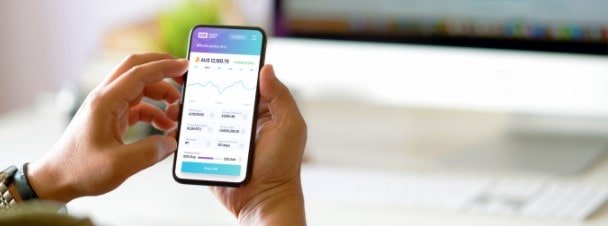11 things you NEED to know about crypto tax in Australia

Trade cryptocurrency in Australia? Keen to minimise your tax payments while staying on the ATO’s good side? Unsure of which tax category your crypto activity falls under? Feeling a little confused about the whole thing?
This article will give you the low-down on 11 essential things you NEED to know about paying tax on crypto in Australia.
What you NEED to know:
- Crypto is a capital gains tax asset (CGT).
- All CGT assets (including crypto) are taxed at your marginal income tax bracket.
- There’s no tax for buying crypto, but there is for selling, gifting, exchanging & purchasing stuff online with it.
- You can get a 50% discount on your capital gains tax if you hold your crypto for 1 year or more.
- Your tax obligations depend on whether you’re classified a crypto ‘trader’ or ‘investor’.
- If you can prove your CGT assets (crypto) are ‘personal use assets’, you may be able to avoid paying taxes on those assets.
- When it comes to crypto tax, there are a lot of common misconceptions and plenty of bad advice out there!
- There are some ways to minimise the amount of tax you pay on your crypto!
- The ATO now provides information on specific crypto tax queries.
- If your cryptocurrency gets stolen or lost, you can claim a capital loss.
- Not filing your crypto taxes properly can have serious repercussions with the ATO.
Let’s begin.
First things first – The ATO (Australian Tax Office) does not view Bitcoin and crypto as money or Australian or foreign currency. Instead, the ATO classes digital currency as property and a capital gains tax asset (CGT).
Most cryptocurrency transactions fall under the capital gains tax regime which requires you to pay a capital gains tax on the profit/loss from your trades. Other common crypto activities such as mining/staking fall under regular income tax.
2. All CGT assets (including crypto) are taxed at your marginal income tax bracket for the year
A CGT event occurs when you dispose of any cryptocurrency, such as if you:
- Sell or gift cryptocurrency
- Trade or exchange cryptocurrency for another crypto or fiat currency
- Convert your cryptocurrency to fiat currency (eg Australian dollars)
- Use it to obtain goods or services
In Australia, cryptocurrency transactions (and all capital gains tax assets) are taxed at your assessable/nominal/marginal income tax bracket which depends on your total income during the tax year. There is no special tax rate for CGT and your capital gains form part of your assessable income.
Assessable income is calculated like this:
Assessable Income = Income + Capital Gains – Deductions
Resident tax rates 2020–21 (Australian residents only)
Resident tax rates 2020–21 | |
Taxable income | Tax on this income |
0 – $18,200 | Nil |
$18,201 – $45,000 | 19 cents for each $1 over $18,200 |
$45,001 – $120,000 | $5,092 plus 32.5 cents for each $1 over $45,000 |
$120,001 – $180,000 | $29,467 plus 37 cents for each $1 over $120,000 |
$180,001 and over | $51,667 plus 45 cents for each $1 over $180,000 |
The above rates do not include the Medicare levy of 2%. For information about tax for seniors and pensioners, click here.
Source: ATO
EXAMPLE: If you earn between $18,201 – $45,000 (including the capital gain amount) then you will be paying 19 percent on the gain/profit from your crypto.

3. There’s no tax for buying crypto, but there is for selling, gifting, exchanging & purchasing stuff online with it
Like most countries around the world, there are no taxes for buying or holding crypto in Australia. However, when you ‘dispose’ of your crypto, whether that be selling it, gifting it, using it to buy things online, or exchanging it for another cryptocurrency, you will be required to pay a capital gains tax (CGT) on your capital gain.
Thus, it is important to keep accurate records of your crypto purchases (even if you plan on HODLing!) so you can calculate the cost base of the transaction when you decide to dispose of the crypto. The cost base refers to the total equivalent AUD value spent in acquiring the asset.
Even if the market value of your cryptocurrency changes, you do not make a capital gain or loss until you dispose of it.
A note on exchanging crypto: Even though trading one crypto for another means that any gains you’ve made haven’t actually been realised in fiat currency yet, CGT still applies.
So, when you trade one cryptocurrency for another, you’re essentially receiving property rather than money in return for the first cryptocurrency. Therefore you need to keep a record of the value (in Australian dollars) of the cryptocurrency you receive.
A note on gifting/receiving crypto: Gifting crypto is exactly the same as selling it, so it is a taxable event and you need to pay capital gains tax. If you own cryptocurrency, and you transfer (gift) it to another person, you’ve disposed of a capital asset and a CGT event has occurred.
When gifting crypto, you’re taken to have received its market value at the time of the disposal as capital proceeds, and you’ll need to work out whether you have made a capital gain or a capital loss on the transaction (and pay the tax accordingly).
Additionally, you don’t have to pay taxes when you receive cryptocurrency as a gift. However, you will be subject to capital gains tax at the time of disposal of that cryptocurrency. In a sense, this means tax will need to be paid twice when gifting.
When receiving crypto as a gift, use the market value of the gift on the day you received it when calculating any capital gain or loss.
A note on paying for stuff online with crypto: Purchasing goods or services with cryptocurrency is subject to the same tax treatment as selling crypto. Whether you’re paying bills using crypto or using BTC to pay for a coffee, these are all taxable events (with some exceptions – see the section on the personal use asset exemption).
A note about transferring crypto to a different wallets that you own: Moving crypto between different wallets or accounts is not a taxable event and doesn’t trigger capital gains tax. Having said that, it’s important to keep track of these movements if you are using an automated crypto tax software.
4. You can get a 50% discount on your capital gains tax if you hold your crypto for 1 year or more
Generally, if you make a capital gain when you dispose (sell, gift, exchange, etc.) of your crypto you will pay tax on some or all of that gain.
However, if you hold your crypto for at least one year then you can get a 50% discount on the capital gains.
With this in mind, it might be in your best interest to do as they say and hold/HODL!s
EXAMPLE: Emily, an Australian resident, buys 1 BTC for $4000 in 2017. She sells it 14 months later in August 2018 for a total of $6000.
Her capital gain is therefore: 6000 – 4000 = $2000.
Assuming she earns an income of $20,000 during the year. her tax bracket would be 19%. However, since she sold the crypto after holding it for more than one year, she can get a 50% discount on her CGT and only needs to declare a capital gain of $1000 (instead of $2000) which will be taxed at 19%.
Note: the long-term CGT discount does apply to crypto-to-crypto trades. However, by the same token, the 12 month holding period is reset every time you sell, trade or convert your cryptocurrency.

5. Your tax obligations will depend on whether you’re classified a crypto ‘trader’ or ‘investor’ (Most people are investors)
The vast majority of people who buy cryptocurrency are seen as investors by the ATO (buying crypto for the purposes of holding it for long-term gain).
However, if you are running an explicitly crypto-oriented business, such as a mining farm, or are operating as a trader rather than an investor, then the rules are different and you may have access to many of the tax benefits available to small businesses.
A trader is generally someone conducting a business for the purpose of earning income from buying and selling cryptocurrency. A trader treats their profits as business income rather than assessing each transaction as a capital gains event.
Generally, if you’re holding crypto with the aim to make a long-term gain, you’re likely an investor. If you’re looking to regularly buy and sell crypto over the short term for the purpose of making profits, then you may be classified as a trader.
While there’s no clear definition of what constitutes a trader, or a crypto orientated business, if you do fall into the ‘trader’ category you will likely have:
- Made a significant capital investment.
- A focus on short-term profit gain, as opposed to long-term investment.
- High volume, repetitive and regular transactions which take place on a daily or weekly basis.
- Buying and selling behaviour that suggests active trading – Things like business registration, strategy documents, office space, business planning, budgeting, consistent asset selection and business-like record keeping.
If you think you might be able to fall into the category of trader rather than investor, we recommend that you seek professional advice from a crypto tax specialist to make the process (especially if you are new to this) a lot easier!
6. If you can prove your CGT assets (crypto) are ‘personal use assets’, you may be able to avoid paying taxes on those assets
If you can prove your cryptocurrency is a ‘personal use asset’, some capital gains or losses that arise from the disposal of a cryptocurrency may be disregarded.
According to the ATO:
Cryptocurrency is a personal use asset if it is kept or used mainly to purchase items for personal use or consumption.
Cryptocurrency is not a personal use asset if it is kept or used mainly:
- as an investment
- in a profit-making scheme, or
- in the course of carrying on a business.
What constitutes a personal use asset is something of a grey area, however, there are some general guidelines to keep in mind.
Cryptocurrency is more likely to be a personal use asset when it is acquired and used within a short period of time for personal use or consumption.
However, where the cryptocurrency is acquired and held for some time before any such transactions are made, or only a small proportion of the cryptocurrency acquired is used to make such transactions, it is less likely that the cryptocurrency is a personal use asset (it is then classified as an investment), especially if you are profiting off its change in market price).
While you can find the ATO’s stance on crypto as personal use assets here, generally speaking, the longer a cryptocurrency is held, the less likely it is that it will be a personal use asset – even if you ultimately use it to purchase items for personal use.
If you do intend on applying for this personal use asset exemption, we recommend that you keep two separate wallets – one for investments and one for personal use – this will make proving your intention for the crypto to the ATO a lot easier at tax time.
Note: Only capital gains you make from personal use assets acquired for less than $10,000 are disregarded for CGT purposes. However, all capital losses you make on personal use assets are disregarded.
7. When it comes to crypto tax, there are a lot of common misconceptions and plenty of bad advice out there!
It is important to do your own research and read the fine print carefully – false information (as much as you want it to be true, can land you in a lot of trouble).
Common misconception 1: If you have under $10,000 in Crypto, it’s for personal use and isn’t taxed.
This is a common mistake that comes from misreading the way that the ATO treats crypto as a personal use asset.
It’s true – you can buy up to $10,000 of crypto for personal use. But the definition of personal use here is very specific: usually, it’s buying crypto to directly buy something else over a short time period (and not profiting from the longer-term changes in market price).
Common misconception 2: You can reduce your regular income tax through capital gains losses.
Because crypto is treated as a CGT asset, you only make capital gains or capital losses. Capital losses can only be offset against capital gains and not against your regular income! Even if you have more capital losses than gains you cannot reduce your total taxable income.
Common misconception 3: If you gift cryptocurrency you do not have to pay capital gains tax on it!
In the words of the ATO:
“You generate a ‘CGT event’ every time you sell, trade or gift cryptocurrency.”
“Even gifting cryptocurrency will incur a capital gains tax and the person receiving the crypto will also have to pay tax on it if they choose to convert it to AUD or to exchange it for a different cryptocurrency.”
Common misconception 4: Bitcoin and cryptocurrency transactions are anonymous and the ATO does not have access to your wallet or crypto transaction history.
While some coins do offer an added level of privacy, the blockchain, in essence, is an immutable and public ledger of transactions which essentially stores all the transactions made forever. In other words, if you’re doing some dodgy tax stuff you may well be leaving a permanent paper trail which could cause you a lot of grief down the track.
Additionally, if your private wallet has ever interacted with a wallet on an exchange, or you’ve posted it publicly to a social media account linked to one of your emails, there is a good chance it can be traced back to you. It is not difficult to reasonably link a wallet to an identity, and the ATO, if they choose, can access the records of all major Australian crypto exchanges.
8. There are some ways to minimise the amount of tax you pay on your crypto! Be smart and reap the rewards!
- HODL! Do what many recommend and hold your crypto for more than 12 months (from time of purchase). That way you can take advantage of the 50% long-term CGT discount.
- Be clear about your trading intentions: Is your crypto an investment or is it for trading or personal use purchases? By having different wallets for different purposes, proving your intention to the ATO will be a lot easier.
- Transact more frequently from your personal use wallet to avoid being a hodler/investor (the longer a cryptocurrency is held, the less likely it is that it will be a personal use asset – even if you ultimately use it to purchase items for personal use or consumption).
- Use capital losses to offset capital gains: If you have a net capital loss through cryptocurrency, you can use it to reduce a capital gain you make in a later year. There’s no time limit to how long you can carry forward capital losses, but they must be used if you make a capital gain in a subsequent year. Capital losses cannot be used to offset your income from work.
- Know the tax laws and deduct as much as possible: if you’re a trader or are running a crypto business, you could be eligible to claim significant deductions on your regular income.
- Use a crypto tax tool or enlist the help of a crypto tax specialist.
- Deduct crypto tax software and tax adviser fees. The ATO allows you to deduct crypto tax software costs associated with completion and lodgement of your tax return along with the fee you paid to a recognized tax adviser. You can enter this amount under ‘D10 – Cost of Managing tax affairs’.
- Don’t leave your tax to the last minute! If you are completing your tax return for July 1, 2020 – June 30, 2021, it needs to be filed by October 31, 2021. Be safe and get cracking early.
- Donate cryptocurrency to a registered charity – this is not considered a taxable event. Additionally, you can claim the amount (calculated as a fair price for the cryptocurrency at the time it’s donated) as a deduction on your total income on your tax return.
- Do not exchange cryptocurrency to fiat currency to then buy products and services. This disqualifies it as a personal use asset.
- If you can, try to buy products or services for personal consumption directly from the vendor without using a payment gateway or other bill payment intermediary.
- Disclose everything. If the ATO feels you’ve been deliberately hiding your crypto trading, you could be liable for severe fees and penalties.
9. The ATO now provides information on specific crypto tax queries, including chain splits, airdrops, crypto mining, staking, crypto loans, ICOs and much more!
The Australian government and the ATO have begun treating crypto (and crypto tax) more seriously. While they have cracked down on the rules and regulations, they’ve also provided a clear stance on some of the more niche crypto scenarios.
Visit the ATO’s crypto information page or another online guide for the low-down on things like chain splits, airdrops, crypto mining, staking, crypto loans, ICOs/IEOs and moving crypto between wallets.
10. If your cryptocurrency gets stolen or if you lose your private key, you can claim a capital loss
We hope this doesn’t happen – and it won’t if you’re vigilant. Still, if something does go amiss, in order to claim a capital loss for hacked or stolen cryptocurrency, you need to be able to provide certain evidence. This includes:
- The wallet address that the key belongs to
- When you acquired the key and when you lost it
- The cost of acquiring the stolen/lost cryptocurrency
- The fact that the wallet was controlled by you
- The amount of cryptocurrency at the time that you lost the key
- That you possess the hardware where the wallet is stored
- The transactions to the wallet from an exchange which is linked to your identity

11. Not filing your crypto taxes properly can have serious repercussions with the ATO
With Australian regulators catching on to the fact that crypto is here to stay, tax obligations have become stricter and more defined.
The ATO is focused on ensuring that all crypto traders meet their tax obligations and there have been many recent stories where they have been actively tracking down crypto traders and sending out warning letters when people dispose of their crypto.
All major crypto exchanges in Australia are now also covered by AUSTRAC. That means they keep records of transactions and the identities associated with those transactions, and the ATO can access those records.
Whether you are using cryptocurrency as an investment, for personal use or in business, it is important to keep the following records:
- the date of your crypto transactions
- the value of the cryptocurrency in Australian dollars at the time of the transaction (which can be easily exported from a reputable online exchange)
- what the transaction was for and who the other party was (even if it’s just their cryptocurrency address).
The kind of records you should keep include:
- receipts of purchase or transfer of cryptocurrency
- exchange records
- records of agent, accountant and legal costs
- digital wallet records and keys
- software costs related to managing your tax affairs
Remember: it’s (literally) the ATOs job to keep you honest and ensuring you pay the same amount of taxes as everyone else on your crypto.
While there are grey areas when it comes to crypto (and taxes), we don’t recommend trying to bend the law or ignore some of the tax guidelines the ATO has put in place. Not only is it a poor long-term strategy, but the repercussions can be serious and not worth the money you think you’re saving on taxes!
Paying crypto tax in Australia
We hope this article has been helpful. While crypto tax might seem like a bit of a headache, once you know where your activity stands, it really isn’t that difficult.
In reality, there’s as much bad advice out there as there is good advice (Facebook groups and online forums in particular).
While it’s good to talk to other crypto traders, you should always do your own research when it comes to things like paying crypto tax, especially because rules vary wildly between countries and even the type of trader you are.
Around the world, countries have very different approaches to crypto taxes.
You want to make sure you’re getting info that’s relevant to your specific trading activity and not from a different kind of trader or tax forum from, say, Germany or Singapore.
Anyway, that’s all for today – thanks for sticking with us!
If you’re looking for the simplest way to trade crypto in Australia with low fees, sign up with Digital Surge and join thousands of other smart investors trading crypto the easy way.
Good luck and happy trading!
Did this answer your question?
Digital Surge is the easiest way for Australians to buy, sell & store over 250+ cryptocurrencies. With extremely low fees, a uniquely user-friendly interface and a customer-support team you can rely on, getting involved in crypto has never been easier. Sign up today and enjoy safe, stress-free trading.
Crypto-curious? The time you spend here will be the best investment you ever make.

